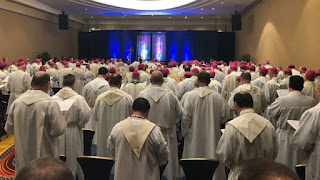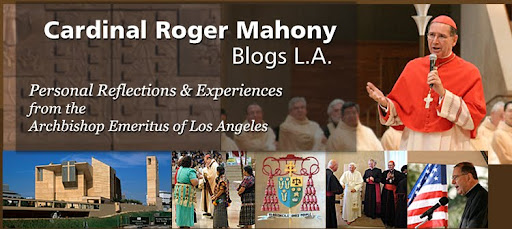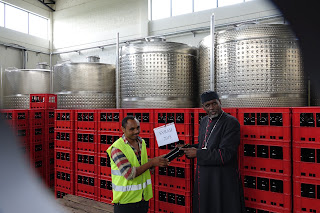Vatican News:
The Bishops of the United States are meeting in Baltimore this week for their regular Fall General Assembly, with the prelates expected to address numerous topics, including the formation of priests, the political responsibilities of Catholics, and the strategic priorities for the Church in the United States for the coming years. At the meeting, the Bishops will also be electing a new President and Vice-president, as well has chairmen for several committees of the USCCB.
 |
| Bishops at prayer during the 2019 Fall General Assembly of the US Bishops' Conference |
Nuncio addresses Bishops
After introductory business, the Apostolic Nuncio to the United States, Archbishop Christophe Pierre, took the floor to address the assembled Bishops. While recognizing the many challenges the Church faces, Archbishop Pierre also focused on the strengths of the American Church, including its defence of human life and religious liberty, as well as the rights of migrants and families, and its generosity in charitable works, especially for the most vulnerable.In the face of an increasingly secularized culture, the Nuncio encouraged the Bishops to reflect on the missionary nature of the Church; how all members of the Church partake in her mission; collegiality among the Bishops themselves; communion within the Church, and especially with priests; and on how to address the shortage of clergy.
The gift of communion with the Pope
In view of the Bishops’ ongoing “ad limina” visits (taking place over the next several months), Archbishop Pierre suggested to the Bishops that “it may be useful to prayerfully reflect on the gift of communion with the Bishop of Rome”. He encouraged them to bring the Magisterium of Pope Francis to their people, focusing on the teachings of the Apostolic Exhortations Evangelii gaudium and Amoris laetitia, and the Encyclical Laudato sí, as well as the Holy Father’s recent teachings on human fraternity. “Our communion with the Holy Father”, he said, “can be expressed in the concrete actions that we take to make his Magisterium better known among the people”.Renewed fervor for evangelization
Archbishop Pierre also invited the Bishops, when they go to Rome, to share with the Holy Father “good news” from their Dioceses, and urged them to a renewed fervor for evangelization, in order to fulfill the “Holy Father’s dream for a ‘missionary option’ in the Church”.He concluded his address by acknowledging the “spiritual and cultural heritage” of the Church in the United States, as well as the “faith and devotion” of the American Bishops and their flocks. “I am confident”, he said, “that the Church in the United States will discover the right path for its spiritual renewal so that it can continue to be the Church that Christ calls it to be”.
Reprinted from Vatican News




































